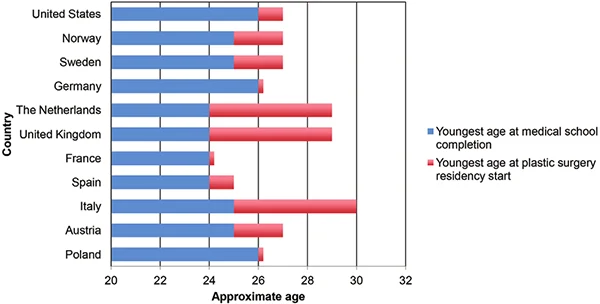Decoding Med School Admissions: Essential Steps For Success
competitive environment. An informed approach, backed by a deep understanding of the procedure, is often the key to success.
This guide aims to demystify the medical institute entrance application system, offering practical steps toward achieving career goals. Keep reading to decode the secrets to success in this challenging journey.
Understanding the Med School Admissions Landscape
Navigating the med school entrance requires a comprehensive understanding of its components. Central to this process are the AMCAS (American Medical College Application Service) and the MCAT (Medical College Admission Test) exam.
However, creating an exceptional application requires more than just a competitive MCAT score. It’s equally relevant to gain clinical experience, secure impactful letters of recommendation, and write a personal statement that truly resonates.
It may also help to write a medical note denoting gratitude before the interview. This thank-you note could leave a good impression on the interviewer long before meeting the person. It’s one way to boost your potential success in the entrance procedure.
THINGS TO CONSIDER
The paycheck overwhelmingly influences medical students’ choice of specialty field, with 75% of students saying future earnings were important to their decision. More men felt this way than women.
Essential Steps for Successful Med School Admissions
Securing admission to a medical institute is a highly competitive system, requiring careful planning and preparation. Below are key steps to make the admittance journey a successful one:
Excel in Academics and the MCAT
Medical schools place great importance on academic achievement. Therefore, having a strong GPA and MCAT scores can bolster the resume and show better preparation for the academic challenges of the training center.
Concentrate on securing top marks in main subjects like biology, chemistry, and physics. Consider taking classes in biochemistry and anatomy as well to strengthen your scientific foundation further.
When confronted with certain challenging subjects, actively seek support through study groups, tutoring, or further coursework.
Meanwhile, when preparing for the MCAT, take advantage of study resources, review classes, and practice exams to ensure good preparation to achieve a competitive score.
Engage in Extracurricular Activities
Engagement in extracurricular activities showcases competence and commitment to a health-related lifestyle.
That said, consider pursuing opportunities in research, clinical experiences, and volunteer work, focusing on areas that are of genuine interest.
These experiences should provide a deeper understanding of healthcare and demonstrate your initiative and leadership skills.
Moreover, balance is also necessary while taking part in extracurricular commitments. While varied experience is beneficial, deeper understanding in a few areas can be more impactful.
So, consider opting for activities that resonate with your career goals, allowing meaningful contributions.
Obtain Letters of Recommendation and Personal Statement
Strong letters of recommendation are a cornerstone of an entrance letter. These should come from mentors or supervisors who can speak about your abilities and character.
That said, aim to build meaningful relationships with faculty and professionals in the healthcare field.
Meanwhile, a personal statement is also a relevant component. It’s an opportunity to articulate your interest for medicine and journey toward this career choice. Be sincere and reflective.
Emphasize your unique qualities and how experiences have shaped your desire to pursue a career in medicine. Use this as a platform to demonstrate passion, dedication, and readiness.
Prepare For Interviews
The interview stage is an integral part of the medical application process. If invited for an interview, take the time to prepare thoroughly.
Research the school, review common interview questions that are often asked, and practice responses.
Be ready to articulate motivations, showcase interpersonal skills, and discuss your personal experiences.
Moreover, approach each interview as a conversation rather than an interrogation. Be genuine while responding, and express enthusiasm for the field.
Demonstrating interpersonal skills is as relevant as showcasing academic achievements as the healthcare industry values building empathetic communication as an integral tool.
Extra Tips for Success
The AMCAS application process is comprehensive and demands full attention. So, ensure every section is meticulously completed and double-check for any errors.
Moreover, prepare the admission file according to each program, highlighting why you’re a good fit for their curriculum and community.
Stay organized and mindful of deadlines throughout the entrance procedure. Keep track of each training institute’s requirements and timelines.
A well-planned procedure reflects the capability to handle the organizational demands of a career in medicine.
It can also help to network with current students and professionals who can provide insider insights and valuable advice.
Make it a point to participate in medical conferences, seminars, and workshops to forge new relationships and gain insights from experienced professionals.
Challenges of Med School Admissions
One significant challenge is the high level of competition. Thousands of qualified candidates apply each year, making the procedure highly selective.
Hence, this competition necessitates academic excellence, distinct extracurricular achievements, and personal qualities.
Another hurdle is the stress and uncertainty inherent in the entrance system. Many applicants struggle with the anxiety of waiting for decisions and the possibility of rejections or waitlists.
To effectively manage this, it is pivotal to maintain a positive outlook, stay engaged in activities, and have a backup plan prepared to navigate the uncertainties that may arise.
The final concern is the financial aspect of applying to a training center. Application fees, MCAT costs, and potential travel expenses for interviews can add up, creating a financial burden.
That said, consider exploring fee assistance programs and scholarships with planning and seeking financial advice to manage these expenses.
The graph below shows the average age of students applying to med school for admissions in different countries.

What to Do When Waitlisted or Rejected
If you’re waitlisted for med school, demonstrate continued interest in the program. Send updates on any new academic or extracurricular achievements to the admissions committee, showing your ongoing commitment to medicine. Reach out for feedback on the application to identify areas for improvement.
If rejected, use this as a learning opportunity for the future. Request feedback from the respective management, identify weaknesses in your application, and work on them.
Moreover, think about gaining more experience through work or volunteering in healthcare to strengthen your letter for the next cycle.
Additional Considerations
For underrepresented minorities, seeking mentorship and resources tailored to your unique experiences is valuable.
Many medical organizations offer programs and support networks to help navigate the specific challenges you might face.
Consider engaging in programs focused on diversity in medicine, which can provide support and opportunities.
Exploring alternative pathways like post-baccalaureate programs can also be beneficial, especially for those needing to strengthen their academic credentials.
These programs often provide the necessary coursework and advice to enhance the entrance application.
Final Thoughts
Successful med training center admissions hinge on understanding the process and preparing meticulously. Be proactive in your approach, and don’t hesitate to seek supplementary resources and support. Your dedication and effort can turn your medical school aspirations into reality.








